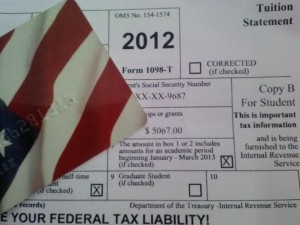Lower income individuals and families in WNC are receiving more of a tax return this year than last year as President Obama’s plan to pull the middle class out from below the poverty line begins to take shape.
The U.S. Census Bureau released data in 2011 that stated nearly one out of every five mountain residents lived in poverty in 2010 throughout more than half of the regions 17 counties. The Community Table, a non-profit organization that serves free meals to people and families here in Jackson County, confirms that 15.1 percent of county residents live below poverty level as of 2010.
But as the lingering National Debt continues to loom, some Americans believe that there are too many Americans abusing the nation’s welfare system while the wealthier are “paying the tab” as they are taxed at a higher rate than the lower earning people.
John Stephens, a tax paying young American who has collected unemployment in the past, believes that Americans should keep what they earn and force a rising working class to make tougher decisions when they approach their own income.
“Taxing the wealthier more puts more money into welfare,” Stephens said, “and most of the Americans on welfare are good and able-bodied workers who COULD go out and get their own job and WORK, but by separating that tax bracket between the upper-class and middle-class, it enables those same able-bodied people to continue to draw welfare while the working taxpayers are paying for that to happen.”
Jesse Cochran works in the family-owned Nick & Nate’s restaurant in Sylva and likes that he will be getting more money on his returns this year than last year.
“Good. I like getting more money for what I work for,” Cochran added. Cochran feels the extra payout is something he has earned. When asked what he was going to do with his extra money he replied, “buy stuff I want.”
Amber Thomas is a mother of a one-year-old, a fairly newlywed, and on top of that a teacher. Amber and her husband Justin have also received more returns this year than last. Although appreciative, Thomas knows where her extra cash will be going.
“It’s all gotta go to bills,” replied Thomas.
Thomas is also all too familiar with the other side of the system. Amber’s younger sister was a drug addict and was abusing the welfare system while living with her parents as they raised her two children.
“It’s just aggravating to know that while I’m out busting my hump to have something, she is just sitting there on her [big] butt with her hand out, and people keep putting money in it,” Thomas reacted.
Her sister has since enrolled in a rehab program, but for a long time, Thomas could not understand how so many people could be so willing to help those who are not interested in helping themselves.
Seth Roland recalls members of his own family bragging about how much they receive in food stamps and would even sell their stamps for money so that they can buy drugs.
“The rule they basically had,” Roland shares, “was that whatever you would pay a person in cash, you would get that in double the food stamps.”
Thomas wonders what would happen if the benefits for her sister and people like her who are abusing the system were taken away, if just for a month, because most people don’t know what they have until it’s gone. Would it be a life lesson learned?
President Obama proposed his top five solutions to cut poverty in the United States during his State of the Union. The president plans to:
1)Create Good Jobs.
2)Raise wages. Specifically minimum wage to $9 an hour
3)Train next generation of workers.
4) Invest in children, specifically early education.
5) Strengthen families. The president has proposed an end to financial penalties for marriage in public policies as well as calling for the Violence Against Women Act, which ensures more women are able to benefit from services and reforms to flee abusive relationships.
A more detailed synopsis of President Obama’s points is available here.
The following is data according to the 2010 Census Data that shows counties in WNC’s population, per ca pita income, high school completion rate, and bachelor’s degree rate. 2010 Census Data of WNC.





